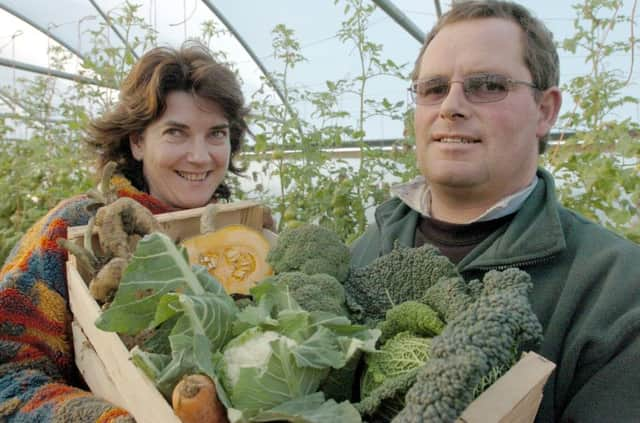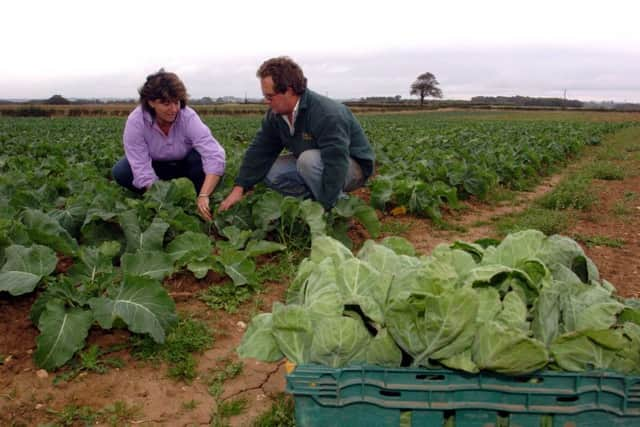Yorkshire hungry for the taste of healthier organic meat and milk


The study, published in the British Journal of Nutrition, showed that organic meat is lower in two saturated fats linked to an increased risk of heart disease and that organic milk contains higher concentrations of iron, Vitamin E and some carotenoids.
Not that Ms Watson, the proprietor of one of Yorkshire’s longest established organic shops, The Organic Pantry at Rudgate, Tadcaster, is in any way surprised.
Advertisement
Hide AdAdvertisement
Hide Ad“Our customers have known for years that organic produce not only tastes better but is better for you,” she said.


“There is growing awareness of the benefits of organic foods as people take more interest in what they eat.
“The quality of organic meat is now first class and consistently high: the supply is much more professional than it used to be and farmers have really stepped up to the mark.
“Organic chickens are a big seller for us, as is beef, pork and lamb. The market is growing all the time and our trusted, local suppliers are excellent at keeping up with demand.”
Advertisement
Hide AdAdvertisement
Hide AdThe Newcastle University researchers reviewed 196 papers on milk and 67 papers on meat from around the world and found “clear differences” between organic and conventional milk and meat, especially in terms of fatty acid composition, and the concentrations of certain essential minerals and antioxidants.


The researchers say their findings show a switch to organic meat and milk would go some way towards increasing our intake of nutritionally important fatty acids.
Chris Seal, Professor of Food and Human Nutrition at Newcastle University, said: “Omega-3s are linked to reductions in cardiovascular disease, improved neurological development and function, and better immune function.
“Western European diets are recognised as being too low in these fatty acids and the European Food Safety Authority recommends we should double our intake. But getting enough in our diet is difficult.
Advertisement
Hide AdAdvertisement
Hide Ad“Our study suggests that switching to organic would go some way towards improving intakes of these important nutrients.”
Switching to organic meat and milk would raise omega-3 fat intake without increasing calories and undesirable saturated fat. A half litre of organic full fat milk - or equivalent fat intake from dairy products - provides an estimated 16 per cent (39 mg) of the recommended, daily intake of very long-chain omega-3, while conventional milk provides 11 per cent (25 mg).
The more desirable fat profiles in organic milk were closely linked to outdoor grazing and low concentrate feeding in dairy diets, as prescribed by organic farming standards.
Professor Carlo Leifert, of Newcastle University, said: “People choose organic milk and meat for three main reasons: improved animal welfare, the positive impacts of organic farming on the environment, and the perceived health benefits.
Advertisement
Hide AdAdvertisement
Hide Ad“But much less is known about impacts on nutritional quality, hence the need for this study.
“Several of these differences stem from organic livestock production and are brought about by differences in production intensity, with outdoor-reared, grass-fed animals producing milk and meat that is consistently higher in desirable fatty acids such as the omega-3s, and lower in fatty acids that can promote heart disease and other chronic diseases.”
He said the study also found 74 per cent more iodine in conventional milk, which is important for people in Britain where iodised table salt is not widely available.
Iodine is low in most foods, except seafood, and the World Health Organisation (WHO) recommends Iodine fortification of table salt to address this.
Advertisement
Hide AdAdvertisement
Hide AdProf Lifert added: “We have shown without doubt there are composition differences between organic and conventional food.
“Taken together, the three studies on crops, meat and milk suggest that a switch to organic fruit, vegetables, meat and dairy products would provide significantly higher amounts of dietary antioxidants and omega-3 fatty acids.”
One of the biggest barriers to ‘going organic’ for many consumers has been the price differential between organic and non-organic produce, but Ms Watson, whose farm has been fully organic certified since 1999, says the gap is closing.
“The cost of organic meat has been coming down for many years and there is no longer any reason to view it as a ‘luxury’ purchase,” added Ms Watson.
Advertisement
Hide AdAdvertisement
Hide Ad“Young people, in particular, are now very conscious of what they’re eating. We are at the Leeds University farmers’ market every Monday and organic meat is always popular.
“The students might not have a lot to spend but they want to buy with confidence. It’s hard to see the growing popularity of organic meat and milk ending, but if it does you good and tastes better why should it?”